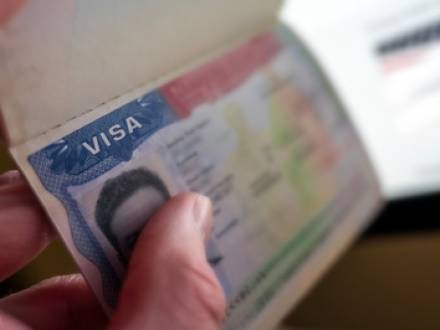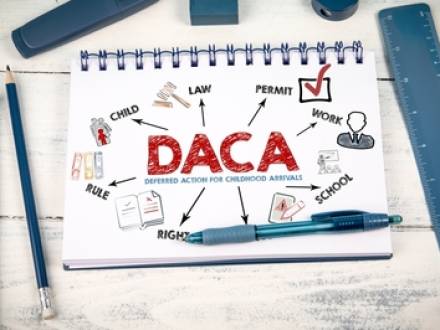Recent Blog Posts
Texas Families Impacted by Pause on 19-Country Immigration
 On December 3, 2025, immigration applications from 19 countries subject to a travel ban were paused indefinitely. The administration claimed the pause was due to national security concerns. The policy memo posted to the website of US Citizenship and Immigration Services (USCIS) also placed an immediate "adjudicative hold" on all asylum applications, regardless of the person’s nationality, and directed a review of "high-risk countries of concern" admitted after January 20, 2021.
On December 3, 2025, immigration applications from 19 countries subject to a travel ban were paused indefinitely. The administration claimed the pause was due to national security concerns. The policy memo posted to the website of US Citizenship and Immigration Services (USCIS) also placed an immediate "adjudicative hold" on all asylum applications, regardless of the person’s nationality, and directed a review of "high-risk countries of concern" admitted after January 20, 2021.
The administration also stated that "anyone who is not a net asset to the United States" would be removed. This news sent shockwaves through many Texas communities. Families who were already navigating the long, stressful immigration process now face considerably more uncertainty.
Stalled case updates, sudden eligibility questions, concerns about whether loved ones will reach the U.S., and worries about whether those already here will be forced to leave are all likely. Employers sponsoring workers, Texans with immigrant relatives, or individuals waiting on consular processing must understand what this new "pause" actually means. An experienced Dallas, TX immigration attorney is ready to help you understand your best path forward.
Texas County Border Resolutions Affect Mixed-Status Families
 Across Texas, counties are increasingly adopting "border security" resolutions or participating in enforcement efforts. These efforts are expanding immigration-related activities into local jurisdictions. While most attention focuses on state and federal immigration, county actions can have immediate consequences for mixed-status families. A mixed-status family means some family members are U.S. citizens or lawful residents, while others are undocumented.
Across Texas, counties are increasingly adopting "border security" resolutions or participating in enforcement efforts. These efforts are expanding immigration-related activities into local jurisdictions. While most attention focuses on state and federal immigration, county actions can have immediate consequences for mixed-status families. A mixed-status family means some family members are U.S. citizens or lawful residents, while others are undocumented.
This increased local enforcement, along with shifts in county sheriff department priorities and formal cooperation with federal agencies, can threaten family unity. Understanding how these resolutions work and how they can impact mixed-status households is critical. Speaking to a knowledgeable Dallas, TX immigration attorney can help you determine what you can do now to protect your family and your future.
DACA Recipients in Texas May Have Work Permits Revoked
 As immigration laws continue to change almost weekly, a new proposal from the current administration could strip more than 86,000 Texas DACA recipients of their work permits. DACA recipients, also known as "Dreamers," have been a part of a years-long battle between Obama-era programs and the Trump administration. Now, it is looking like these DACA recipients may have no choice but to leave their homes in Texas and move to a state where they are allowed to work and make a living.
As immigration laws continue to change almost weekly, a new proposal from the current administration could strip more than 86,000 Texas DACA recipients of their work permits. DACA recipients, also known as "Dreamers," have been a part of a years-long battle between Obama-era programs and the Trump administration. Now, it is looking like these DACA recipients may have no choice but to leave their homes in Texas and move to a state where they are allowed to work and make a living.
Judge Andrew Hanen, a U.S. District Court judge, will soon rule on a proposal submitted by the current administration that could render Texas DACA recipients ineligible for work permits typically offered under former DACA rules. If you find yourself in this untenable situation – potentially forced to move your family to a state that will let you work – it is time to speak to a knowledgeable Plano, TX immigration lawyer.
Texas and the End of TPS for Venezuelans: What Happens Now
 Immigration laws and issues appear to be in a state of constant flux. TPS holders are feeling those changes – and not in a good way. In early October, the Supreme Court of the United States granted an emergency request by the current administration to end Temporary Protected Status (TPS) for more than 300,000 Venezuelans currently living and working in the United States. The administration has also significantly scaled back the TPS program for countries such as Honduras, Nicaragua, and Nepal.
Immigration laws and issues appear to be in a state of constant flux. TPS holders are feeling those changes – and not in a good way. In early October, the Supreme Court of the United States granted an emergency request by the current administration to end Temporary Protected Status (TPS) for more than 300,000 Venezuelans currently living and working in the United States. The administration has also significantly scaled back the TPS program for countries such as Honduras, Nicaragua, and Nepal.
Texas ranks second in the U.S. for the number of Venezuelan TPS holders, particularly in the Houston, Dallas, and San Antonio metro areas. Ending the TPS program for Venezuelans will likely have a significant impact on the Texas labor market, particularly in healthcare, construction, and logistics, where the majority of these individuals legally worked. If you are losing TPS status, speaking to an experienced Dallas, TX immigration attorney can help you determine what options may be available.
T-Visa Certification in Texas: Working with Prosecutors
 For Texas non-citizen victims of human trafficking, safety and justice may depend on two very different systems working together. The state criminal courts that prosecute traffickers, and the federal immigration system that offers victims protection through a T-Visa, must work in tandem to allow human trafficking victims a safe haven.
For Texas non-citizen victims of human trafficking, safety and justice may depend on two very different systems working together. The state criminal courts that prosecute traffickers, and the federal immigration system that offers victims protection through a T-Visa, must work in tandem to allow human trafficking victims a safe haven.
The T-Visa (Form I-914) allows specific trafficking victims to remain in the U.S., obtain authorization to work, and eventually apply for a green card. However, proof that a person was the victim of trafficking and cooperated fully with law enforcement often originates from Texas police reports and court proceedings.
Coordinating these records can make or break a T-Visa case, and with the constant changes to immigration laws under the current administration, it is essential to have an experienced Plano, TX immigration lawyer.
Employers Beware: $100K H-1B Application Fee Explained
 The current administration recently imposed a $100,000 fee on H-1B visas in an effort to curb what it says is an "overuse" of the program. White House officials claim this new measure will incentivize companies to employ more American workers. A separate order established a new "gold card" immigration pathway that fast-tracks visas for specific immigrants in exchange for a staggering $1 million fee – or $2 million for a company sponsor.
The current administration recently imposed a $100,000 fee on H-1B visas in an effort to curb what it says is an "overuse" of the program. White House officials claim this new measure will incentivize companies to employ more American workers. A separate order established a new "gold card" immigration pathway that fast-tracks visas for specific immigrants in exchange for a staggering $1 million fee – or $2 million for a company sponsor.
The $100,000 fee for H-1B visas will almost certainly have a significant impact on industries that heavily rely on H-1B workers. Immigration policies are changing rapidly; those who want to come to the U.S. legally require a legal advocate who keeps up with all these changes. If you were planning on obtaining an H-1B visa, a Plano, TX immigration lawyer can help you understand how these new rules may affect you.
Driving Without a License: Immigration Consequences in Texas
 For many undocumented immigrants in Texas, the everyday tasks that many of us take for granted (driving to work, taking our children to school, running errands) can come with significant legal risks. Unlike some states (like Illinois), Texas does not issue driver’s licenses to undocumented residents.
For many undocumented immigrants in Texas, the everyday tasks that many of us take for granted (driving to work, taking our children to school, running errands) can come with significant legal risks. Unlike some states (like Illinois), Texas does not issue driver’s licenses to undocumented residents.
This leaves thousands of working people with a tough choice: risk driving without a license or struggle to survive without being able to drive. Driving without a driver’s license in Texas as an undocumented immigrant is much more serious than a mere traffic violation. You can be criminally charged and face jail time, as well as serious immigration consequences, including deportation.
If you do not have lawful status in the United States, it is crucial that you understand how a simple traffic stop can quickly spiral into an immigration nightmare. It can be beneficial to consult with an experienced Plano, TX family immigration lawyer before you find yourself in such an untenable situation.
Relocating Within Texas During an Immigration Case
 Immigration cases can take months or even years to move through the system. Under the current administration, those times will likely increase. While families wait on immigration decisions, they may need to move within the state for a work opportunity, more affordable housing, or better schools for the children. Unfortunately, relocating with a pending immigration case is not as simple as packing your things and signing a new lease.
Immigration cases can take months or even years to move through the system. Under the current administration, those times will likely increase. While families wait on immigration decisions, they may need to move within the state for a work opportunity, more affordable housing, or better schools for the children. Unfortunately, relocating with a pending immigration case is not as simple as packing your things and signing a new lease.
The U.S. immigration system requires applicants to follow very strict procedures when changing addresses. Failing to comply with these procedures could delay an immigration case even further or could even place the entire case in jeopardy. It can be extremely beneficial for you to speak to a knowledgeable Plano, TX immigration lawyer who can help you sort out the required process for moving.
Why Does an Address Matter in Immigration Cases?
Under U.S. Citizenship and Immigration Services rules, immigrants with pending applications, temporary visa holders, and green card holders are legally required to notify USCIS of any address change. Important notices and documents related to your case are typically sent to the current address on file, including:
Texas Educators Say Law Bans Immigration Enforcement in Schools
 As the countdown to the new school year begins, in school districts across the state of Texas, there are hundreds, if not thousands, of children who lack legal status. It is a national right that all children in the United States are entitled to a public education, regardless of their citizenship or immigration status - or is it?
As the countdown to the new school year begins, in school districts across the state of Texas, there are hundreds, if not thousands, of children who lack legal status. It is a national right that all children in the United States are entitled to a public education, regardless of their citizenship or immigration status - or is it?
The enhanced efforts by the current administration to remove or detain undocumented persons across the nation, with courthouse raids and ICE agents at job sites and in neighborhoods, have left educators wondering whether there will be raids in schools. Federal law has historically prohibited ICE agents from entering school grounds, but it is not a significant leap to imagine such an occurrence.
Teachers in Texas schools (and all schools in the U.S.) believe their job is to ensure every student receives the best education possible – and are hoping that undocumented immigrant raids never become a part of the public school experience. If you are a parent worried about your child’s undocumented status, now is the time to speak to an experienced Plano, TX immigration lawyer about your status and your rights.
Texas Hospitals Now Required to Ask About Immigration Status
 Governor Abbot signed an executive order almost a year ago (August 2024) that required hospitals to ask every patient their immigration status. The order was scheduled to begin in November 2024. The first set of data was released by the Texas Health and Human Services Commission in March, covering a four-month period from November 1 to February 28. During those months, approximately 108,000 undocumented patients sought care in Texas hospitals.
Governor Abbot signed an executive order almost a year ago (August 2024) that required hospitals to ask every patient their immigration status. The order was scheduled to begin in November 2024. The first set of data was released by the Texas Health and Human Services Commission in March, covering a four-month period from November 1 to February 28. During those months, approximately 108,000 undocumented patients sought care in Texas hospitals.
It is important to note that this number was a very small percentage of all patients treated by those same hospitals – only about 2.3 percent of all patients were undocumented. It is also important to know that while Texas hospitals are now required to ask about immigration status, patients are not required to answer, and about 12.9 percent declined to answer the question. Hospitals closest to the border, such as those in Webb County, had the highest share of undocumented patients.






